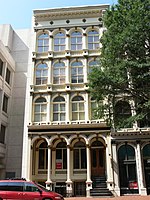United States Court of Appeals for the Fourth Circuit

The United States Court of Appeals for the Fourth Circuit (in case citations, 4th Cir.) is a federal court located in Richmond, Virginia, with appellate jurisdiction over the district courts in the following districts: District of Maryland Eastern District of North Carolina Middle District of North Carolina Western District of North Carolina District of South Carolina Eastern District of Virginia Western District of Virginia Northern District of West Virginia Southern District of West VirginiaThe court is based at the Lewis F. Powell Jr. United States Courthouse in Richmond, Virginia. With 15 authorized judgeships, it is mid-sized among the 13 United States Courts of Appeals.
Excerpt from the Wikipedia article United States Court of Appeals for the Fourth Circuit (License: CC BY-SA 3.0, Authors, Images).United States Court of Appeals for the Fourth Circuit
East Main Street, Richmond Shockoe Slip
Geographical coordinates (GPS) Address Phone number Website External links Nearby Places Show on map
Geographical coordinates (GPS)
| Latitude | Longitude |
|---|---|
| N 37.53769 ° | E -77.43481 ° |
Address
U.S. Court of Appeals for the Fourth Circuit
East Main Street 1000
23219 Richmond, Shockoe Slip
Virginia, United States
Open on Google Maps











